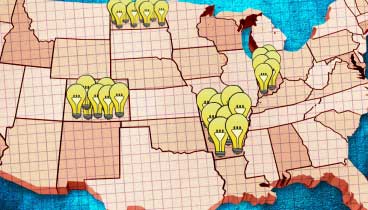Scholars have long been interested in tracking “knowledge spillovers,” the way technical and intellectual advances spread among communities of researchers and innovators. A significant body of work has shown that distance matters when it comes to the dissemination of knowledge. Advances are more likely to be noted by those nearby the advance’s origin.
|
ADVERTISEMENT |
Now a new study co-authored by an MIT assistant professor adds a wrinkle to this issue: National and state boundaries have a distinctly limiting effect on knowledge spillovers, as revealed by an examination of roughly 30 years of data on patent citation. A patent is less likely to be cited by someone working, say, 100 miles away from its point of origin if that distance means crossing a state line, within the United States, or a country line, around the world. The spread of knowledge has a clear geopolitical shape.

Graphic: Christine Daniloff
…
Add new comment